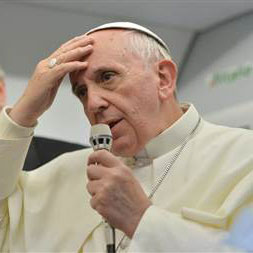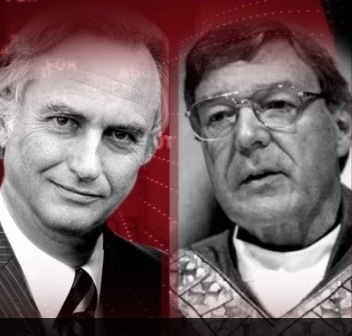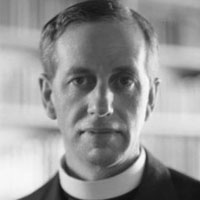I’ve received a surprising number of e-mails relating to the Pope’s remarks on the plane.
During the flight from Rio to Rome, Francis held an open-ended press conference. John Paul II established the practice, and Benedict continued it. It provides an unscripted glimpse into the mind of the pope, and typically attracts a lot of press attention.
If you relied on the mainstream media, you might think Francis’ 80 minute press conference was devoted entirely to homosexuality. Actually, no. He also spoke about curial reform. About communion for Catholics who are divorced and remarried. About the ordination of women. About Pope Benedict. John L. Allen can fill you in.
These are interesting issues to Catholics, but not to the secular press. So they focused instead on Pope Francis’ remarks about not judging gay people. The press treated it as revolutionary, and it is revolutionary, if your knowledge of Catholic doctrine derives from The New York Times rather than the Catechism of the Catholic Church. (I think we can deduce that many journalists reside in something of an echo chamber.)
Here’s the full translation and context of the Pope’s remarks on this issue.
The question to Pope Francis from Ilse, a journalist on the papal flight
I would like to ask permission to pose a rather delicate question. Another image that went around the world is that of Monsignor Ricca and the news about his personal life. I would like to know, your Holiness, what will be done about this question. How should one deal with this question and how does your Holiness wish to deal with the whole question of the gay lobby?
The Pope’s Answer
Regarding the matter of Monsignor Ricca, I did what Canon Law required and did the required investigation. And from the investigation, we did not find anything corresponding to the accusations against him. We found none of that. That is the answer.
But I would like to add one more thing to this: I see that so many times in the Church, apart from this case and also in this case, one looks for the “sins of youth,” for example, is it not thus? And then these things are published. These things are not crimes. The crimes are something else: child abuse is a crime.
But sins, if a person, or secular priest or a nun, has committed a sin and then that person experienced conversion, the Lord forgives and when the Lord forgives, the Lord forgets and this is very important for our lives.
When we go to confession and we truly say “I have sinned in this matter,” the Lord forgets and we do not have the right to not forget because we run the risk that the Lord will not forget our sins, eh? This is a danger. This is what is important: a theology of sin.
So many times I think of St. Peter: he committed one of the worst sins denying Christ. And with this sin they made him Pope. We must think about fact often.
But returning to your question more concretely: in this case [Ricca] I did the required investigation and we found nothing. That is the first question.
Then you spoke of the gay lobby. Agh… so much is written about the gay lobby. I have yet to find on a Vatican identity card the word gay. They say there are some gay people here. I think that when we encounter a gay person, we must make the distinction between the fact of a person being gay and the fact of a lobby, because lobbies are not good. They are bad. If a person is gay and seeks the Lord and has good will, who am I to judge that person? The Catechism of the Catholic Church explains this point beautifully but says, wait a moment, how does it say, it says, these persons must never be marginalized and they must be integrated into society.
The problem is not that one has this tendency; no, we must be brothers, this is the first matter. There is another problem, another one: the problem is to form a lobby of those who have this tendency, a lobby of the greedy people, a lobby of politicians, a lobby of Masons, so many lobbies. This is the most serious problem for me. And thank you so much for doing this question. Thank you very much!






“The problem is not that one has this tendency; no, we must be brothers, ”
If the Holy Father would have just added ‘as long as the tendency is not acted on which would be a sin’ none of this misinformation would have happened.
I don’t know about that Johnny. Remember Pope Benedict’s remarks about condoms during a similar in-flight press conference? Benedict’s comments were highly nuanced, but the mainstream media ignored the nuance in the pursuit of “making news,” and misinformation thrived.
Yes that is true Father. I heard this question asked on one of the news shows…..So Cardinal Dolan does this mean that the homosexual act will not be a sin any longer? I was flabbergasted and I think Cardinal Dolan was a little taken aback. I mean how did this person come to that point of asking that question from what the Holy Father said? Cardinal Dolan’s answer, once he recovered, was sound up to a point. He said that Church teaching comes from God not the Church so it can not change. But then when on to say perhaps a change in emphasis. Now that is where I do not understand. The emphasis should be on the total teaching of the Church. Not one over the other. Jesus did not condemn the adulteress woman (compassion) but then he told her to sin no more (conversion).
A picture’s worth a thousands words.
The Bible instructs that “As a man thinks in his heart, so is he” (Proverbs 23:7). And it warns “do not conform to the pattern of this world, but be transformed by the renewing of your mind” (Romans 12:2). Thus there is no such thing as a “Thief Christian,” an “Adulterer Christian,” or a “Drunkard Christian.” There are only Christians whose lower nature leans toward those or other sins of the flesh. We do not define ourselves by the sins that tempt us. There is no such thing as a “Gay Christian.” The very notion is anti-biblical.
“The concept of “Gay Christians” originates in sexual-orientation theory, an ideological invention of the homosexual movement designed to advance the idea that homosexuality is “immutable,” meaning unchangeable…”
“If the pope has conceded that “gayness” is an acceptable basis for self-identity, that suggests he is willing to integrate people into the priesthood who define themselves by their sin, rather than as sinners washed and transformed by the blood of Christ. When identification with sin is a present-tense basis for your identity, you are unrepentant about remaining unwashed and untransformed. That’s very dangerous for the priests themselves, and in the church community virtually guarantees that the “gay lobby” will continue.”
Read more at http://www.wnd.com/2013/08/where-the-pope-gave-ground-on-gays/#hyXjIJi0wkg9RVgS.99
In regards to gay priest, Pope Francis said, “Who am I to judge?” But this past April 16, on Pope Benedict’s birthday, Francis did judge the Catholic traditionalist, who want to use the Extraordinary form of the Mass, as “stubborn” and “foolish.” He considered foolish and stubborn these people that want to “restrain the Holy Spirit.” By his choice of words, Francis might have been showing his disagreement to Pope Benedict XVI, who said that there should be some restraints on the spirit of Vatican II. Did he insult Benedict on his birthday???? One last thing, although Pope Francis said there was no evidence that Monsignor Battista Ricca, the recently appointed overseer of the Vatican Bank, was an active homosexual, the Catholic gay community is apparently not agreeing with his holiness. Read more:
“The intimacy of the relations between Ricca and Haari was so open as to scandalize numerous bishops, priests, and laity of that little South American country, not last the sisters who attended to the nunciature”http://espresso.repubblica.it/dettaglio/the-prelate-of-the-gay-lobby/2211440//0
http://newwaysministryblog.wordpress.com/2013/07/23/vatican-banks-gay-scandal-highlights-holy-sees-sexuality-problems/
Clearly from the two articles posted above, there is a huge amount of evidence and witnesses, that Monsignor Ricca was living a life of moral depravity, but Pope Francis says “He found nothing.” What does this mean? Does it mean that he found nothing about the man’s past that he himself is disturbed by? Through a few Google searches, I found all kinds of disturbing stories about Ricca’s past that tell me, that he is not a man to be trusted with the faith or money.